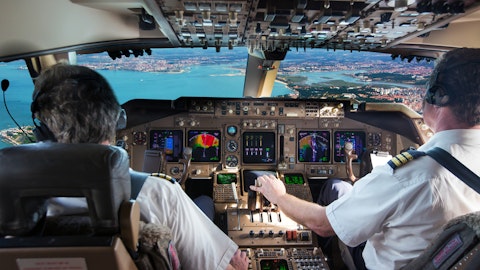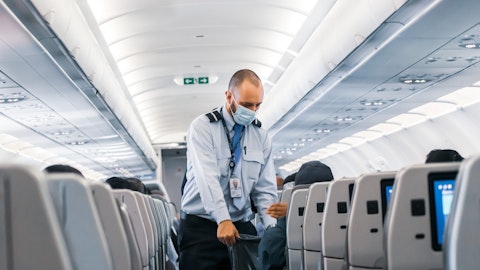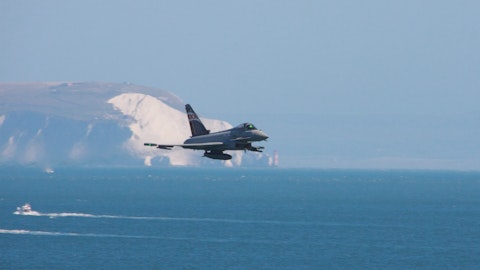Andrew Nocella: We’re still putting our plan together. So I don’t want to say it’s final. But — and I did say in my prepared remarks that we would have — I forget the exact words, but low type of really slow growth domestically. Look, our commercial efforts are just focused on overseas at this point. And across the Pacific, in particular, into the South Pacific and so we’re executing — we’re going to execute really well on that capacity, in my opinion, and that’s where our focus. As Mike said, there are a few constraints. We have OEM issues and all that kind of leads to that outcome. And we think it’s the right outcome for our capacity for next year. And we’ll have a lot more to say in early 2024.
Operator: We will now switch to the media portion of the call. [Operator Instructions] Leslie Josephs from CNBC.
Leslie Josephs: I was wondering if you are seeing — if you can kind of put into context how many requests for status matches you’ve seen since Delta made those changes last month. And then also on your push to premium, can you talk a little bit about the supply chain currently and how far behind you are on upgrading those cabins, and when you expect things to catch up?
Andrew Nocella: Sure. Look, I’ll give a little bit of commentary. Our status matches up dramatically. Yes. Is dramatically a big number? No. So, that’s all I’ll say on that front. And in terms of the signature interiors, we are definitely facing some constraints, but I’ll pass that over to Toby, who runs that program for us.
Toby Enqvist: Thank you, Andrew. I think we’re about a year behind. But the good news is that we’re still taking in new deliveries. So we’re just right now flying about 120 airplanes that have the new interior design which we have gotten regularly, which is really good for us operationally as well because it has space for one bag for each passenger. So no bag has come out. So that’s probably the biggest thing. So I think right now, we’re targeting 2026 for 100% to be complete.
Scott Kirby: Well, I’d just add that this is another one of the things that United got right. We believe back in 2020 that there was going to be a full recovery in demand and thought that the pandemic as tough as it was represented a once in history opportunity to get prepared and invest for the future. So two of the things we did was get ahead of the curve and we built more club space. So we now have 49% more club space than we did before the pandemic. And we just opened our — two largest clubs in our entire system that are great for customers. Feedback is awesome, one in Denver, one in Newark. So we plan ahead for that. And while the signature interiors are behind, we today have close to double the number of premium seats that we had pre-pandemic.
So this is a team that started back in the summer of 2020 to prepare for the recovery in premium demand. And that’s the reason Andrew said in his remarks, we don’t need to change our programs and do anything because we’re prepared for this.
Leslie Josephs: Okay. And on the other end of the spectrum with Basic Economy, are customers just flying that because they’re more price sensitive now, or — and I wasn’t sure 50%, what percentage of your revenue is Basic Economy.
Andrew Nocella: Leslie, I would say, it’s likely a lot more share shift that in the previous quarters and years we didn’t have the large gauge aircraft to accommodate all the different range of passenger types and product types adequately. And we are now just beginning, but we have a lot more flexibility, and we’re able to accommodate those passengers and it happened. And I think I would describe it as probably a fair amount of share shift.
Operator: Moving to the next caller, Mary Schlangenstein from Bloomberg News.
Mary Schlangenstein: I wanted to ask you about the situation in Israel. And whether you are assessing potential for that to spread to other areas and perhaps even to some areas of Europe where you may have to cancel more flights because people might be poking away over worries. And if you’re seeing any of that already where that’s shifted to other countries or other cities that you serve?
Scott Kirby: We’re not seeing that at all.
Operator: Moving to our next caller, Justin Bachman from The Messenger. Please go ahead.
Justin Bachman: I wanted to go back to Scott’s point about the industry landscape changing. And I was hoping that you might be able to elaborate a bit on that where — if we are facing a situation where every American chooses to fly Delta and United, what does that suggest where — for the rest of the industry as far as other players, do they become smaller, more niche or is there just too many airlines out there? I just wanted to see if you could expand on what that suggests over time.
Scott Kirby: I don’t think it suggests that. But I think what we are proving is that customers care about quality product and service. And I think because of that, the airlines that succeed are going to invest in quality product and service. And if you don’t do that, you’re going to fail.
Mike Leskinen: And Justin, I’m going to jump in on this as well. What has changed is cost convergence, right? At this point, we’re able to provide incremental seats to our customers at a price point that is competitive with the ULCCs and we provide a better product. And so customers are choosing to fly a better product at a similar price and we are just getting started.
Justin Bachman: Right. No, I fully understand that. I’m just thinking, if you play that movie out, what does that suggest for the competitive landscape in two, three, four years if those trends continue and things don’t continue as they have been.
Mike Leskinen: That’s a question for those airlines, not for us.
Operator: I will now turn the call back over to Kristina Edwards for closing remarks.
Kristina Edwards: Thanks for joining the call today. Please contact Investor and Media Relations if you have any further questions, and we look forward to talking to you next quarter.
Operator: Thank you all. This concludes today’s conference, and you may now disconnect.
Follow United Airlines Holdings Inc. (NASDAQ:UAL)
Follow United Airlines Holdings Inc. (NASDAQ:UAL)
Receive real-time insider trading and news alerts





